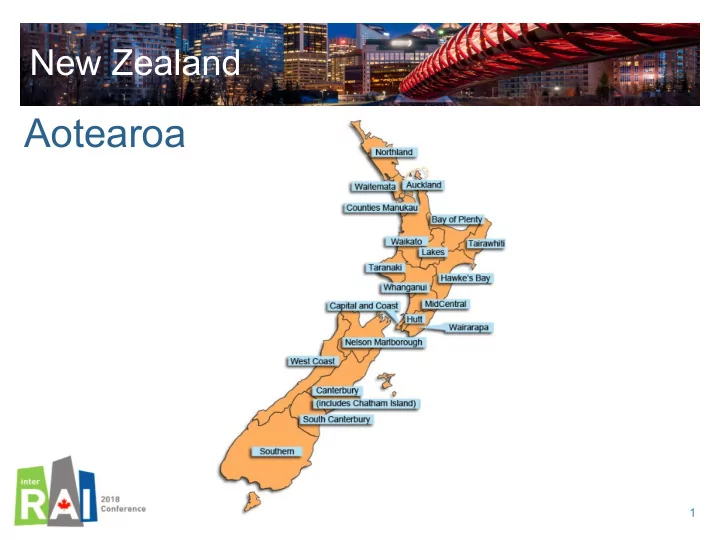

New Zealand NEW ZEALAND Aotearoa 1
Canadian interRAI Conference 2018 Linking a cultural conversation with interRAI assessments, using the Meihana model Wellness for Life – A Priority for All
3
The Meihana Model The Meihana Model helps students to complete the Kaupapa component of the clinical interaction/assessment so they achieve both clinical and cultural integration in their practice. Acknowledgement Associate Professor Suzanne Pitama Māori/Indigenous Health Institute University of Otago, Christchurch Tel 03 364 3677 Email suzanne.pitama@otago.ac.nz 4
Meihana Model Copied with permission: Otago University, Māori Indigenous Health Institute ( MIHI ). NB: Must not be printed without permission Improving Maori health through clinical assessment: Waikare o te Waka o Meihana Pitama, Suzanne; 5 Huria, Tania; Lacey, Cameron. The New Zealand Medical Journal (Online) The New Zealand Medical Journal (Online);; Christchurch Vol. 127,1393 , (May 2, 2014): 107-19
Learning Objectives for interRAI educators Achieve Training – Hauora Cultural Access to conversation health for all Factors Components affecting the of voyage to interactions Hauora 6
Components of the Meihana Model Linking with interRAI items Patient: Patient identifying as Māori with ethnicity correctly confirmed • Often inaccurately recorded • All patients should be asked their ethnicity and have this reviewed over time • Cultural safety/competency Whānau : Support network available to the client • Often feel excluded • Inclusion important in gathering history and understanding symptoms and impact on patient/whānau • Assess whānau understanding of the condition, prognosis, and their expectations around management 7
Tīnana : Physical health and Functioning of the patient • Encourages to assess past and current functioning to clearly understand the physical status of the patient • Considers symptoms, treatments, exercise, diet, physical exam and substance use Hinengaro : Emotional and psychological wellbeing of the patient • Assessment needs to evaluate psychological wellbeing • Explore the patients perception of their condition and impact this has on their wellbeing 8
Wairua : Beliefs regarding connectedness and Spirituality • Explore attachments to people, places and taonga - treasured items • Allow a conversation about religion, death and dying • A lack of connectedness may be a key risk factor for depression Taiao : Physical environment of the patient/whānau • Home environment - physical and interpersonal spaces promote privacy and dignity, for example, areas for support networks to attend • Are there potential barriers to access the service like car parking, Māori friendly environment? 9
Iwi Katoa : Health services and systems that provide patient/whānau support • Identify whether the patient/whānau have had appropriate access to services/systems • Exploring current enablers/barriers to access services helps towards planning care 10
Linking Meihana Model to interRAI strategy 11
interRAI Māori strategy Ministry of Health guiding Meihana Model of Clinical Our NGĀ TOHUTOHUNGA NGĀ TOHUTOHUNGA Journey documents Assessment Guiding principles Guiding principles begins with the Conceptual framework for Framework for interRAI We uphold the Treaty of advice from the strategy Assessment We uphold the Treaty of Waitangi principles of: the Waitangi principles of: Partnership, Participation Assessor competencies Waka – the comprehensive clinical Partnership, Participation Māori and Protection assessment and Protection Strategy A cultural conversation Rudder – interRAI Governance Board Working National Standards Group Oars – Partnership, Participation, Aroha ki te rawa kore Aroha ki te rawa kore Culturally appropriate assessment Protection provide support for those provide support for those practices who are vulnerable interRAI who are vulnerable Sails – guiding documents project Culturally appropriate curriculum In the waka are the interRAI Services 2008-2012 and delivery Aspiration team and resources We create new and better ways for success Business Learning Value Customer processes and growth Courage We step up, address difficult Refresh training People and Guidance for Improving issues, saying what needs to curriculum assessors connections capability be said Action Professionalism Plan Establish We do the job to the highest 2018/21 formal link to Review standard Develop Train broker training workforce educators Integrity opportunities materials and cultural to train We gain confidence and for Māāori educator capability others trust through ethics, honesty input and induction and authenticity feedback
interRAI Māori strategy NGĀ TOHUTOHUNGA NGĀ TOHUTOHUNGA NGĀ TOHUTOHUNGA Guiding principles Guiding principles Guiding principles We uphold the Treaty of Waitangi principles of: We uphold the Treaty of Waitangi principles of: Partnership, We uphold the Treaty of Waitangi principles of: Partnership, Participation and Protection Participation and Protection Partnership, Participation and Protection Aroha ki te rawa kore provide support for Aroha ki te rawa kore provide support for those who are vulnerable Aroha ki te rawa kore provide support for those who are vulnerable those who are vulnerable Aspiration Aspiration We create new and better ways for success We create new and better ways for success Courage Courage We step up, address difficult issues, saying what needs to be said We step up, address difficult issues, saying what needs to be said Professionalism Professionalism We do the job to the highest standard We do the job to the highest standard Integrity We gain confidence and trust through ethics, honesty and authenticity
interRAI Māori strategy Meihana Model of Clinical Ministry of Health guiding Our documents Assessment Journey begins with Framework for interRAI Conceptual framework for the the Assessment strategy advice from • Assessor competencies • Waka – the comprehensive the clinical assessment Māori • A cultural conversation Strategy • Rudder – interRAI • National Standards Working Governance Board • Culturally appropriate Group • Oars – Partnership, assessment practices interRAI Participation, Protection • Culturally appropriate project • Sails – guiding documents curriculum and delivery 2008-2012 • In the waka are the interRAI Services team and resources
interRAI Māori strategy Business Learning Value Customer processes and growth Refresh Guidance People and Improving training for capability connections curriculum assessors Action Plan Establish Review 2018/21 formal link to Develop training Train broker workforce materials educators opportunities and cultural to train for Māori capability educator others input and induction feedback
He waka eke noa We are all on the canoe, with no exception 16
Recommend
More recommend